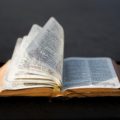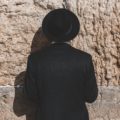Exodus: Vaera: Len, May 6
This piece first appeared in Jewish Currents.
Vaera
Exodus 6:2 - 9:35
Washington, DC
Dear friends,
At my Jewish preschool, we were taught at Thanksgiving that the Puritans came to America because they weren't permitted to study Torah in England. Back at home, my mother, an aide at the school, mocked this piece of misinformation. It was my first lesson in the unreliability of teachers. Much later, I would learn that my preschool teacher was, from a certain point of view, correct. The New England Puritans imagined themselves the inheritors of the self-proclaimed chosen people's special contract with God. "I will make a difference between My people and your people," God tells Moses to tell the Egyptians in Exodus, in the New King James Version of the Bible. The Puritan minister Increase Mather echoed these lines in a 1674 sermon called "The Day of Trouble is Near." Casting his sect of Christians as the new Jews, he proclaimed, "The dealings of God with our Nation and with the Nations of the World is very different." Puritans like Mather saw themselves as uniquely marked out to establish a theocratic New Canaan in the New World. "Exodus," as Dan wrote last week, "is perversely available to the ideology of the settler, from Plymouth plantation to the hilltops of Gush Etzion."
The question of Jewish chosenness, which finds its most dramatic and compelling treatment in the Book of Exodus, has served as a puzzle and an opportunity for many readers of the Hebrew scriptures. Nearly 300 years after Mather's sermon, Sigmund Freud wrestled with it in his weirdest and most imaginative book, Moses and Monotheism, in which he claimed that the concept of chosenness was without precedent in ancient religion. Vaera, the second parsha of Exodus, contains the book's most programmatic statement of Jewish exceptionalism. At the parsha's outset, we find Moses pleading with Pharaoh to let his people go. Pharaoh refuses, and plagues come down from heaven: water turns to blood; frogs, vermin, and flies invade the land; boils erupt; livestock sicken; hail falls. (The final three plagues appear in the following parsha.) Despite the apparently global sweep of these plagues, however, God's magic confines their effects to the Egyptians: "the LORD will make a difference between the livestock of Israel and the livestock of Egypt. So nothing shall die that belongs to the children of Israel." The difference this difference makes resuscitates God's covenant with Abraham, made hundreds of years earlier and evidently forgotten in the interim. God explains at the beginning of Chapter 6:
I am the Lord . . . I appeared to Abraham, to Isaac, and to Jacob . . . I have also established my covenant with them. . . . And I have also heard the groaning of the children of Israel whom the Egyptians keep in bondage, and I have remembered my covenant . . . I will take you as my people, and I will be your God.
This is the pith of Exodus, the whole story writ small. Despite an ancient lineage and a longstanding deal with God, the Jews are in trouble again. Has the deal been suspended? What kind of God "forgets his human partners for centuries," as Freud put it with some amusement? For the New England Puritans, however, the solution to this riddle was obvious: they knew that the groaning of the children of Israel was a sign not of God's forgetfulness but of his favor. Their groaning indicates their importance; they suffer because they are special, and specially loved—and they know that, if they keep the faith, the future will be unimaginably golden. Used to suffering in the wilderness, the Puritans took comfort in the ancient groaning of the Jews, which signaled the "sanctified afflictions," as Mather put it, that God rains down on those lucky souls with whom He has covenanted.
***
As the historian Sacvan Bercovitch famously argued, the Puritans spun the fantasy of chosenness they drew from their fascination with the ancient Jews into the "exceptionalism" that would come to occupy the center of American ideology. "As Israel redivivus," Bercovitch writes in his 1978 study The American Jeremiad, New Englanders "could claim all the ancient prerogatives" of the biblical Jews, including a divinely authorized state. For these settlers, Bercovitch explained, the wilds of New England took on "the double significance of secular and sacred place." In other words, the forests of Massachusetts had as central a role to play in God's unfolding plan as the deserts of Sinai.
Among the 17th-century North American Puritans, only the renegade minister Roger Williams rejected this Judaizing vision. He believed that the divinely authorized state of the ancient Jews had become, after Christ, an illegitimate aspiration—a conviction that made him one of the earliest theorists of the separation of church and state. For Williams, the wilderness through which Moses led the Jews was, for Christians, a kind of supercharged holy metaphor for the path toward grace. No real forest or desert was required. Williams was also a skeptic of what Bercovitch called the "genetics of salvation," the notion that God's favor could be inherited. After all, the New Englanders could trace their descent to many peoples: "the Britons, Picts, Romans, Saxons, Danes, and Normans," as he wrote in one of his polemical tracts. In other words, if they were chosen, their chosenness could not be, as it was for the ancient Jews, a question of bloodline. Williams, as Bercovitch's predecessor Perry Miller put it, "would be a Christian, but not a Christianized Jew." He was accordingly exiled to Rhode Island.
Freud was preoccupied with the Puritans—not least because he saw something of his own intense ambivalence toward Jewishness in theirs. He admired Oliver Cromwell, the Puritan Lord Protector of England, so much that he named one of his sons after him. "The affinity for militant puritanism, not uncommon among secular Jewish intellectuals, indicates a certain preferred character type, starched with independence and cerebral rectitude rather than with a particular belief or doctrine," writes Philip Rieff (or is it Susan Sontag?) of Freud's feeling for Cromwell. In Rieff's view, Puritanism and Jewish intellectualism converge on the grounds of iconoclasm, the hard-minded rejection of all false images of truth and authority. For Freud, as for many secular Jewish intellectuals, this attraction to iconoclasm entailed a rejection of Jewishness itself. He saw himself as a hero of scientific rationality—"Lord Protector," Rieff quips, of the unconscious mind's "dark dominions"—a disposition that allowed no room for ethnic or tribal affiliation. But in spite of himself, his ambition remained colored by ethnic particularity. Both Freud and his avid Jewish followers could find in his body of thought a transformation of the earlier religious and ethnic formation, serving as both a rejection and a replacement: psychoanalysis is a kind of Talmudic hermeneutics appropriate to modernity, and its priesthood of analysts was to a large extent Jewish. "Among educated Jews in Europe and now in America, Freudianism may be seen as breaking the last painful strands of religious identification," writes Rieff. And yet, "Freud himself retained more loyalty to his Jewishness than his doctrine permits."
For Freud, "chosenness" was a psychopathological fantasy in need of explanation. In this, he had something in common with Roger Williams, who saw the conviction of chosenness among some of his Protestant contemporaries as a dangerous delusion, at least as it pertained to matters of state. Freud, Puritan-obsessed Jew, did him one better: in Moses and Monotheism, he argues that the holy contract established between God and the Jews in Exodus was from the first a fantasy of ethnic self-aggrandizement—and a cover-up for murder. Published in 1939—the last year of Freud's life, while he was in exile from Hitler and dying from cancer—Moses and Monotheism offers a revisionist account of the Exodus. In this version of the story, Moses is an Egyptian who adopts the Jews, leads them out of bondage, teaches them the principle of One God, and is then murdered by them. Moses's rules turned out to be hard to follow; the Jews grew tired of the Commandments and killed their bearer. Judaism, in this story, is the guilt-drenched body of the law erected to conceal this parricide, which, according to Freud's crackpot anthropology, repeats the primal parricide he imagined at the source of all human society. The riddle of Moses is a detective story in which one must find the truth behind the "national motives"—Freud takes the phrase from his colleague Otto Rank—which "transformed the myth into the form now known by us." Freud was struck by the gap between God's covenant with Abraham and His covenant with Moses:
We cannot expect religious myths to pay scrupulous attention to logical connections. Otherwise the feeling of the people might have taken exception—justifiably so—to the behavior of a deity who makes a covenant with his patriarchs containing mutual obligations, and then ignores his human partners for centuries until it suddenly occurs to him to reveal himself again to their descendants. Still more astonishing is the conception of a god suddenly "choosing" a people, making it "his" people and himself its own god. . . . [In other religious traditions,] the people and their god belong inseparably together; they are one from the beginning. Sometimes, it is true, we hear of a people adopting another god, but never of a god choosing a new people.
For Freud, this anomalous act of choosing makes sense only if we understand Moses to have been an Egyptian monotheist who selected the Jews to carry on his new religion. "Moses had stooped to the Jews, had made them his people; they were his 'chosen people,'" Freud writes. In Moses and Monotheism, then, Freud exorcised what he saw as his own irrational identification with Jewishness by demystifying it. "To deny a people the man whom it praises as the greatest of its sons is not a deed to be under-taken lightheartedly—especially by one belonging to that people," he says at the start of the book, with that slightly theatrical bombast that is one of his most endearing traits as a writer. "No consideration, however, will move me to set aside truth in favor of supposed national interests." In the ultimate iconoclastic gesture, Freud makes Moses himself a non-Jew and Jewish law an edifice stained with blood.
As long as the fantasy of chosenness offered by Exodus retains its archetypal power, we will need to reckon with its force and its strangeness. In contemporary American life, the fundamentalist Christian preoccupation with the return of the Jews to Israel is one distressing culmination of the "excited exchange of millennial speculations among Jewish and Christian scholars" that Bercovitch traces back to the 17th century. Meanwhile, liberal Jews skeptical of the notion of chosenness find themselves confronting it anew each Passover, when awkward claims of divine selection can feel like an ethnic variation on the crudest patriotic propaganda of the larger culture: America First. The ameliorative ritual whereby the seder's ethnonationalism is acknowledged and rejected—good politics, bad exegesis, as Dan says—will be familiar to many. Is the disarmament successful? Freud's ironic anthropology suggests, perhaps, a nobler way of managing the burdens of this inheritance: submitting to the truth that even the most powerful sources of identity are also delusions. This heroic posture of demystification may be a fantasy in its own right. But forced to choose between fantasies, I'll take it.
Len Gutkin is associate editor at The Chronicle Review and the author of Dandyism: Forming Fiction from Modernism to the Present (University of Virginia Press, 2020).
ALSO IN THIS SERIES:
Slow Burn, Quarantine Ed.: The Book of Exodus Introduction
Slow Burn, Quarantine Ed.: Exodus: Shemot: Dan, April 25
Slow Burn, Quarantine Ed.: Exodus: Bo: Briallen, May 21
Slow Burn, Quarantine Ed.: Exodus: Beshalach: Omari, May 27
Slow Burn, Quarantine Ed.: Exodus: Mishpatim: Sarah, June 23
Slow Burn, Quarantine Ed.: Exodus: Yitro: Jacob, June 23
Slow Burn, Quarantine Ed.: Exodus: Terumah: Carina, August 11
Slow Burn, Quarantine Ed.: Exodus: Tetzaveh: Pratima, August 11





